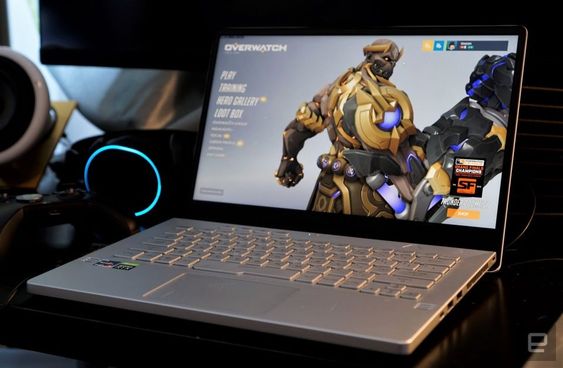Gaming Laptop vs. Gaming Notebook vs. Gaming PC: Which is Right for You?

Gaming Laptop vs. Gaming Notebook vs. Gaming PC: Which is Right for You?
Choosing the right gaming device can be a daunting task, especially with the variety of options available today. Whether you’re looking for portability, power, or a balance of both, understanding the differences between a gaming laptop, a gaming notebook, and a gaming PC is crucial. In this article, we’ll explore the key features, advantages, and drawbacks of each to help you decide which one is right for you.
Gaming Laptops: Portability with Power
Overview:
Gaming laptops are portable computers designed to deliver a gaming experience comparable to desktop PCs. They are equipped with high-performance components like dedicated GPUs (Graphics Processing Units), powerful CPUs (Central Processing Units), and fast SSDs (Solid State Drives).
Pros:
- Portability: The most significant advantage of a gaming laptop is its portability. You can carry it with you anywhere, making it ideal for gamers who travel frequently or need to game on the go.
- Performance: Modern gaming laptops are capable of running the latest games at high settings. Brands like ASUS ROG, Alienware, and MSI offer models with powerful GPUs such as NVIDIA’s RTX series, ensuring smooth gameplay and impressive graphics.
- All-in-One Solution: Gaming laptops come with everything you need in one package, including a built-in display, keyboard, and speakers. This makes them convenient and easy to set up.
Cons:
- Price: Gaming laptops tend to be more expensive than desktops with comparable performance. The portability and compact design come at a premium.
- Thermal Management: Due to their compact size, gaming laptops often struggle with heat dissipation. Extended gaming sessions can lead to thermal throttling, where the laptop reduces performance to avoid overheating.
- Upgradability: Upgrading components in a gaming laptop is limited. While you might be able to upgrade the RAM or storage, other components like the GPU or CPU are usually soldered to the motherboard.
Who Should Buy a Gaming Laptop?
If you value portability and are willing to invest in a device that can be used both for gaming and other tasks like work or study, a gaming laptop is a solid choice. It’s perfect for gamers who need flexibility and are always on the move.
Gaming Notebooks: Slimmed-Down Portability
Overview:
The term “gaming notebook” is often used interchangeably with “gaming laptop,” but it generally refers to a slimmer, lighter version of a gaming laptop. These devices prioritize portability and battery life, often sacrificing some performance to achieve a thinner profile.
Pros:
- Ultra-Portability: Gaming notebooks are designed to be even more portable than standard gaming laptops. They are lightweight and slim, making them easy to carry in a backpack or briefcase.
- Stylish Design: Many gaming notebooks feature sleek, minimalist designs that don’t scream “gamer.” This makes them more versatile for use in professional or academic settings.
- Battery Life: Gaming notebooks tend to offer better battery life than standard gaming laptops, thanks to more efficient components and power-saving features.
Cons:
- Reduced Performance: To achieve a slim design, gaming notebooks often use lower-powered GPUs and CPUs. While they can still handle gaming, they may struggle with more demanding titles or high settings.
- Limited Cooling: The thin profile of gaming notebooks can exacerbate thermal issues, leading to potential performance drops during extended gaming sessions.
- Higher Cost for Less Power: Gaming notebooks are often priced similarly to more powerful gaming laptops, meaning you may pay a premium for the slim design without getting the same level of performance.
Who Should Buy a Gaming Notebook?
A gaming notebook is ideal for gamers who prioritize portability and style over raw performance. If you want a device that can handle casual gaming while also serving as a professional or academic tool, a gaming notebook might be the perfect fit.
Gaming PCs: The Powerhouse
Overview:
Gaming PCs, or desktops, are the traditional choice for gamers seeking the best possible performance. These machines offer unmatched power, customization, and upgradability, making them the go-to for serious gamers and enthusiasts.
Pros:
- Unmatched Performance: Gaming PCs can be equipped with the most powerful CPUs, GPUs, and large amounts of RAM. They can handle the most demanding games at ultra settings, including 4K gaming and VR (Virtual Reality).
- Customizability: One of the biggest advantages of a gaming PC is the ability to customize and upgrade components. Whether it’s adding more RAM, upgrading the GPU, or improving cooling, a gaming PC allows for continuous improvement over time.
- Better Cooling Solutions: Desktop PCs have the space for more advanced cooling systems, such as liquid cooling or multiple fans, reducing the risk of overheating and ensuring sustained performance during long gaming sessions.
- Cost-Effective: While high-end gaming PCs can be expensive, they often offer better value for money compared to gaming laptops or notebooks, especially when you consider performance and longevity.
Cons:
- Immobility: Unlike laptops and notebooks, gaming PCs are stationary. They require a dedicated space and are not easily moved, which limits their flexibility.
- Setup Required: Setting up a gaming PC involves more effort, including connecting a monitor, keyboard, mouse, and speakers or headphones. This can be intimidating for beginners.
- Power Consumption: Gaming PCs typically consume more power than laptops or notebooks, which can lead to higher electricity bills over time.
Who Should Buy a Gaming PC?
If you’re a serious gamer who values performance above all else, a gaming PC is the clear choice. It’s also the best option if you enjoy customizing and upgrading your system, or if you’re involved in activities like video editing or 3D rendering that require significant computing power.
Conclusion: Making the Right Choice
Ultimately, the decision between a gaming laptop, gaming notebook, and gaming PC comes down to your specific needs and lifestyle. If you need a portable device that can handle gaming and other tasks, a gaming laptop or notebook might be right for you. However, if you’re after the best possible performance and don’t mind staying in one place, a gaming PC is the way to go.
No matter which option you choose, understanding the strengths and weaknesses of each will help you make an informed decision and ensure that you invest in the right gaming device for your needs.

